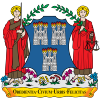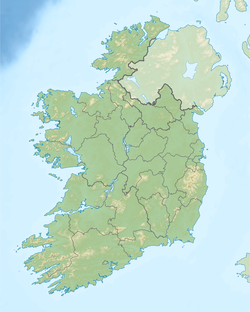Dublin
capital and largest city of Ireland
(Redirected from Baile Átha Cliath)
Dublin (Irish: Baile Átha Cliath) is the capital of the Republic of Ireland, and the biggest city on the island of Ireland.[9] In 2011, there were over 1.1 million people living in the Greater Dublin Area.[10]
Dublin
Baile Átha Cliath | |
|---|---|
| Nickname: The Fair City | |
| Motto(s): | |
| Coordinates: 53°20′59″N 6°15′37″W / 53.34972°N 6.26028°W | |
| Country | Ireland |
| Province | Leinster |
| Government | |
| • Type | City Council |
| • Headquarters | Dublin City Hall |
| • Lord Mayor | Hazel Chu (Green Party) |
| • Dáil Éireann | Dublin Central Dublin Bay North Dublin North-West Dublin South-Central Dublin Bay South |
| • European Parliament | Dublin constituency |
| Area | |
| • Capital of Ireland/City | 114.99 km2 (44.40 sq mi) |
| • Urban | 318 km2 (123 sq mi) |
| Population | |
| • Capital of Ireland/City | 553,165[2] |
| • Density | 4,811/km2 (12,460/sq mi) |
| • Urban | 1,173,179[6] |
| • Metro | 1,347,359[a][5] |
| • Greater Dublin | 1,904,806[b][7] |
| • Ethnicity (2011 Census) | Ethnic groups |
| Demonym(s) | Dubliner, Dub |
| Time zone | UTC0 (WET) |
| • Summer (DST) | UTC+1 (IST) |
| Eircode | D01 to D18, D20, D22, D24 & D6W |
| Area code | 01 (+3531) |
| GDP | US$ 90.1 billion[8] |
| GDP per capita | US$ 51,319[8] |
| Website | www |
Dublin was built by the Vikings upon the river Liffey. The river divides the city into two parts, North Dublin and South Dublin.
Many famous writers lived in Dublin. Oscar Wilde and George Bernard Shaw were born in Dublin. James Joyce is probably Dublin's best known and most international writer.
Dublin is home to Ireland's largest stadium for all sports, Croke Park. It can hold up to 85,000 people. Croke Park is the usual venue for all Ireland hurling and football finals. The Aviva Stadium hosts rugby and soccer.
Notes
changeReferences
change- ↑ "Dublin City Council, Dublin City Coat of Arms". Dublincity.ie. Retrieved 29 August 2015.
- ↑ "Ireland: Cities & Legal Towns". City Population. Retrieved 7 October 2016.
- ↑ "Census of Population 2011" (PDF). Preliminary Results. Central Statistics Office. 30 June 2011. p. 21. Archived from the original (PDF) on 14 November 2012. Retrieved 25 May 2013.
- ↑ "Census of Population 2011". Population Density and Area Size by Towns by Size, Census Year and Statistic. Central Statistics Office. April 2012. Retrieved 30 March 2014.
- ↑ "Sapmap Area - NUTS III - Dublin Region". Census 2016. Central Statistics Office. 2016. Archived from the original on 7 January 2019. Retrieved 16 January 2018.
- ↑ "Census of Population 2016" (PDF). Profile 1 - Geographical distribution. Central Statistics Office. 6 April 2017. p. 15. Retrieved 6 April 2017.
Table 2.2 Population of urban areas, 2011 and 2016 [..] 2016 [..] Dublin city & suburbs [..] 1,173,179
- ↑ "Census 2016 Profile 2 - Population Distribution and Movements - CSO - Central Statistics Office". www.cso.ie. Retrieved 2018-01-18.
- ↑ 8.0 8.1 "Global city GDP 2014". Brookings Institution. Retrieved 18 November 2014.
- ↑ "BBC News - Ireland country profile". BBC News. London: BBC. Retrieved 2 February 2011.
- ↑ "CSO: Statistics: Population of each Province, County and City 2006". cso.ie. 2011. Retrieved 2 February 2011.
Other websites
changeWikimedia Commons has media related to Dublin.
- "The Reflecting City"
- Dublin GDP stats Archived 2012-02-07 at the Wayback Machine
- WikiSatellite view of Dublin at WikiMapia
- The Dublin Community Blog
- Satellite map of Dublin[permanent dead link] - Including local geographic features.
- Dublin - Tourist information.



